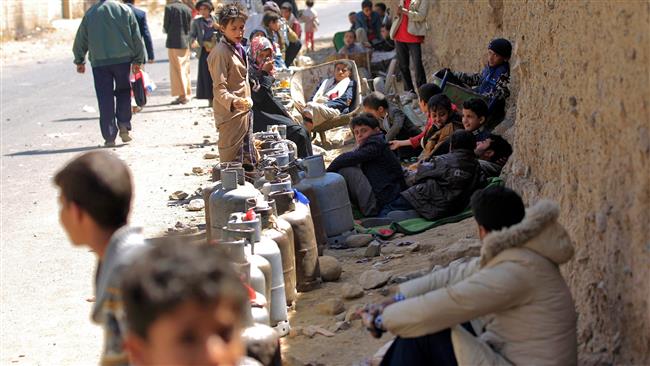‘Saudi siege could kill more hunger-stricken kids in Yemen’


The UN children’s fund has voiced alarm over humanitarian repercussions of the crippling Saudi blockade against Yemen, where some 400,000 kids are already at risk of death due to acute malnutrition.
In a statement issued late Thursday, UNICEF Executive Director Anthony Lake warned that “the recent closure of all ports and airports is making an already catastrophic situation even worse.”
Earlier this week, the Saudi military tightened the blockade against Yemen, closing all ports and halting aid shipments after Yemeni forces fired a missile that hit near Riyadh amid their retaliatory operations.
The blockade was first imposed in March 2015, when Riyadh and a coalition of its allies unleashed a brutal military campaign against the poorest Arabian Peninsula state.
The recent closures have further hindered the flow of aid supplies to the impoverished country, drawing sharp criticisms from the UN and several international aid groups.
“Today, nearly 400,000 children in Yemen are at risk of death from severe acute malnutrition. To potentially add tens of thousands more children to this toll – tens of thousands more personal catastrophes for children and grieving parents – is simply inhuman,” the UNICEF statement said.
Lake further highlighted a call on Wednesday by Mark Lowcock, the UN humanitarian chief, for “safe” and “rapid” access to the areas hardest hit by the Saudi blockade, particularly the Hudaydah port and the Sana’a airport.
“Children are not responsible for the conflict and carnage created by the adults. But they are the first victims,” the statement. “We must ask all the parties: What kind of Yemen do the ultimate victors expect to gain as they destroy it?”

Reports coming out of Yemen say the tightening of the siege has already led to a fuel crisis in the capital, Sana’a.
Yemeni hospitals have also been suffering a growing scarcity of medical supplies.
“The situation is bad and the full blockade on Yemen, including air embargo and sea blockade, have made it even worse,” said Mohamed Abdel Mghani, a doctor at the Sana’a hospital of al-Sabeen.
The US-backed Saudi war has so far killed more than 12,000 civilians, pushed millions of Yemenis to the brink of famine and triggered a severe cholera outbreak there.
In recent weeks, the Saudi air force has stepped up its air attacks against residential areas across Yemen. In the latest carnage, at least 60 people, including women and children, were been killed or injured in a series of airstrikes by Saudi Arabia in Hajjah Province.
The Saudi regime and its allies were placed on a UN blacklist last month for killing and injuring 683 children in Yemen and attacking dozens of schools and hospitals during 2016.
Yemeni armed forces, including the Houthi Ansarullah fighters, national army troops and popular groups, have been defending the country against the Saudi aggression, which was launched to reinstall Yemen’s former Riyadh-backed government.
The Ansarullah movement has warned that Yemeni forces will continue missile attacks against Saudi Arabia as long as Riyadh and its allies press ahead with the war.







